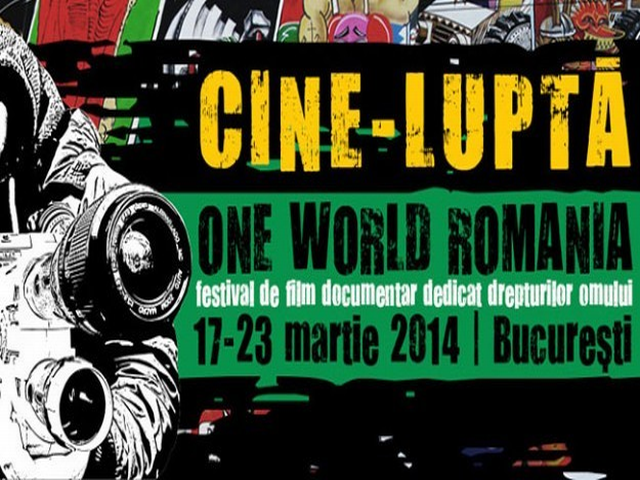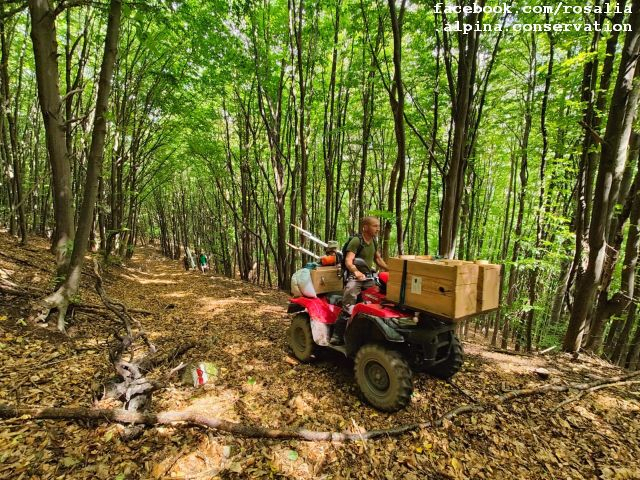One World Romania Festival
The seventh edition of the human rights documentary festival called One World Romania screened a wide range of movies devoted to human rights.

România Internațional, 29.03.2014, 13:01
The seventh edition of the human rights documentary festival called One World Romania held in to Bucharest between March 17 and 23 screened a wide range of movies devoted to human rights. There were a total of 50 films, special screenings, student matinees, a documentary film workshop, theater shows, debates, a masterclass held by Polish filmmaker Marcel Lozinski, and even a special tour of downtown Bucharest. The five main sections of this year were ’25 years later’, ‘Rebel with a cause’, ‘The Crooked State, ‘Love is a human right too’, and ‘The Media Hospital. Adina Bradeanu is a DocWest scholar with Westminster University of the UK. Together with Alexandru Solomon, the festival director, she selected the films that competed this year:
“The way in which we selected the films for this festival is strongly determined by what happens in politics and society, in Romania and the world at large. For instance, we decided to have a section focused on the media, following what happened in Romanian media these last years, namely an attempt by various oligarchs to control writing, speaking and communication in Romania. This great need that Romania has for independent media in Romania made us come up with a special program dedicated to the media”.
The ’25 years later’ section includes 6 recent documentaries that revisit the communist period, but also contains 5 short films made between 1963 and 1983 at Sahia studios. ‘Rebel with a cause’ is the section that brings back to a young Bucharest audience examples of unconventional activism from the ex-Soviet space, but also two Romanian premieres on contemporary activism: ‘Romanian Autumn’, by Matei Budes, and ‘Bucharest, Where Are You?’ by Vlad Petri.
Vlad Petri documented the social movements of 2012 and 2013 of Bucharest, regularly publishing online movies and photos taken on site. He is concerned with investigating immediate reality, also probing the social transformations of which he was part. He says ‘I am most interested in the square as a public venue for debates, proposals and protests. I am interested in how this space develops, how it transforms, what its social impact is. I am passionate about the people there, their way of expressing themselves, how they articulate things and convey messages. I wanted to go as often as I could to the Square, with a capital S, to distribute my movies exclusively through online media, trying to keep up with the pace of events.’ His interest in the square as a public space for debate gave birth to the documentary ‘Bucharest, Where Are You?’, selected for the Rotterdam International Film Festival. Here is Vlad Petri himself:
“In total I had about 50 or 60 hours of footage to make my selection, and the final film has 80 minutes. It was pretty hard, you always regret that you have to give up a lot of things, that you can only show this much. In this hour and twenty minutes I tried to tell a structured and comprehensive story of what happened in the streets. We tried to be as earnest as we could in our reporting. We tried to make the material filmed in the street lead us to a story, we wanted to lead the audience in a certain direction. For us it was a period of research, of discovery, and we started to see the events as a whole differently during editing.”
‘Romanian Autumn’, the film made by Matei Budes, presented in the ‘Rebel With a Cause’ section, is a discreet tribute to Romanians who took to the streets last autumn to protest against the mining project in Rosia Montana, to their cause and unity. Here is director Matei Budes:
“I didn’t want to make a thoroughgoing study, an X-ray of the protests and what happened in the autumn. It is rather a blend of several trends and moments that could be glimpsed from the beginning, the need to debate, the need for a better organization. I would say that the movie is made up of a series of moments captured between September and October 2013. I can say that I don’t have civic spirit in my blood, like most of my compatriots. At the same time, I had contact with people who got involved in this process, who contaminated me. No matter of their education, the contact with these people and certain moments changed me, helped me pay more attention to the world around me, made me more eager to get involved. I would say that civic spirit, the need to get involved in societal issues, comes by contamination. Of course, if I hadn’t taken part in the protests, if I hadn’t talked to the people involved, I would not have been this interested in making a movie. At the same time, I am from Barlad, which is very close to Pungesti, where we had protests against shale gas mining, and I had to pay attention to what happens around us.”
The ‘One World Romania’ 2014 retrospective was dedicated to director Marcel Lozinski. It was called ‘Marcel Lozinski- Master of Random’, with screenings for ten of his movies: ‘Happy End’, ‘The Visit’, ‘Frontal Collision’, ‘Mic Test’, ‘Practical Exercises’, ’89 mm Away From Europe’, ‘How It’s Done’, ‘Father and Son Traveling’, ‘Anything May Happen’, and ‘So It Doesn’t Hurt’. In his 40 years of filmmaking, Lozinski emerged as not only one of the most innovative directors of his generation, but also as one of the most important critics of communist society. Many of his short films speak about the gap between reality and the slogans of official life, about the influence of the press as an instrument for indoctrination, about lies and compromises. This cost him dearly, as only 4 of the 12 movies he made between 1972 and 1980 were released. Lozinski’s most recent movie, screened at the One World Romania Festival, ‘Father and Son Traveling’, is a road movie in which he and his son, also a director, tour Europe in a trailer.






























